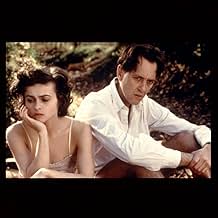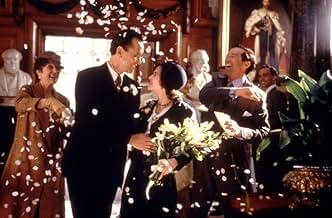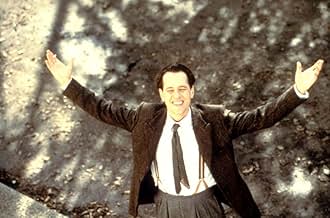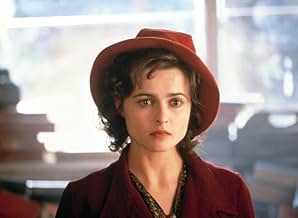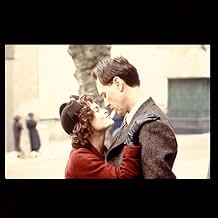CALIFICACIÓN DE IMDb
6.3/10
1.6 k
TU CALIFICACIÓN
Agrega una trama en tu idiomaGordon Comstock quits his job at an advertising agency in order to write poetry, only to find that poets, like everyone else, need money.Gordon Comstock quits his job at an advertising agency in order to write poetry, only to find that poets, like everyone else, need money.Gordon Comstock quits his job at an advertising agency in order to write poetry, only to find that poets, like everyone else, need money.
- Dirección
- Guionistas
- Elenco
- Premios
- 1 premio ganado en total
Barbara Leigh-Hunt
- Mrs. Wisbeach
- (as Barbara Leigh Hunt)
- Dirección
- Guionistas
- Todo el elenco y el equipo
- Producción, taquilla y más en IMDbPro
Opiniones destacadas
How could anyone who had read the book and who had any respect for literature, especially a respected screenwriter such as Alan Plater, turn this story of glum penny-pinched '30's London into 1990's-style standard advertiser's jolly-jumpered "Heritage" golden nostalgia?. Not only did it do violence to the tone of the book, it did violence to its very essence. It does violence too to history - to what it was like to live in London in the 1930's on less than £2 per week. All the more reprehensible as the book was largely autobiographical.
Comstock, a writer, believes that he has talent as a poet but instead is prostituting that talent writing crass advertising slogans in return for money and a comfortable life. This belief that he is wasting his real talent - and his life in this way causes him to attempt to reject the entire world of money, to live in (moderate) poverty and to devote himself to writing poetry. Having rejected "the Money God" he endures the consequences. In the book but not in the film the petty mean realities of poverty in cold 1930's London are spelt out in detail. They weigh him down, make him embittered - and obsessed with the very thing that he wished to escape: Money. His obsession takes the form not of a desire but of an increasing loathing where every kind of failure or slight he suffers is blamed on his lack of money and other people's veneration of it. Comstock's rejection of money makes his life complicated and extremely limited - deciding what each coin in his pocket might buy - can he smoke his single cigarette today or should he to save it for later in the week?
His miserable lodgings are policed over by an ever-watchful landlady who neither allows female visitors inside the front door nor the making or consumption of hot drinks in the room, thus forcing Comstock to find furtive and frustrating ways round the latter and to conduct his romancing of his long-suffering girl friend Rosemary in the streets and public places. Comstock believes the reason Rosemary will not sleep with him is his Lack of Money. Worst of all - for him - he finds that having rejected money and enduring the consequences, he cannot even make any progress on his supposed life's work - his poetry.
The book is in many ways glum. Comstock, as the author notes, becomes complaining and miserable. Comstock describes himself as "moth-eaten". His family had sacrificed all so that he alone would get a "good education" and thus consigned themselves to a life of meanness on his behalf. Comstock's consequent perverse decision to give up "a good job" thus distressed them and gives him occasional twinges of guilt.
A large facet of the book is the way that the reader to some extent comes to share this mean and rather humiliating life. The glumness though is relieved by the self knowledge and perspective of the author making it at times wryly comical.
Comstock is not a Socialist. He has no positive vision, only the negative one of the corrupting effects of money and even those Orwell portrays as being obsessive. His wealthy friend Ravelson, a Marxist, tries to enlist him without success. Orwell, in real life from a middle-class comfortable background himself, chose to lead a life which at best was hair-shirt. At worst had him "Down and Out in Paris and London" and a volunteer in the Spanish Civil War. No other writer in English had quite such a gloomy and masochistic lifestyle.
Comstock chose to work in a badly paid job but will not sponge, he does not accept charity. He has a great deal of integrity especially concerning Art and cannot but be revolted and oppressed by the foolish images and slogans on billboards all around him, some of which he had written: "Corner Table Enjoys his Bovex!" His rather inconsistent scruples and artistic sensibility are a curse not a blessing. The book is presumably Orwell talking about what he felt, experienced and believed then.
This production is pleasant but all that is notable in the book is missing. The instinct for those who respect Orwell's talent (and can endure his glumness) and have any sense of period might well be to throw their copy into the bin baffled at how such a travesty came to be made.
But an excellent BBC TV version was made in the early 1960's starring the late Alfred Lynch and Anne Stallybrass which stayed true to the book. In black and white and studio bound it nevertheless stands head and shoulders above this later production.
Comstock, a writer, believes that he has talent as a poet but instead is prostituting that talent writing crass advertising slogans in return for money and a comfortable life. This belief that he is wasting his real talent - and his life in this way causes him to attempt to reject the entire world of money, to live in (moderate) poverty and to devote himself to writing poetry. Having rejected "the Money God" he endures the consequences. In the book but not in the film the petty mean realities of poverty in cold 1930's London are spelt out in detail. They weigh him down, make him embittered - and obsessed with the very thing that he wished to escape: Money. His obsession takes the form not of a desire but of an increasing loathing where every kind of failure or slight he suffers is blamed on his lack of money and other people's veneration of it. Comstock's rejection of money makes his life complicated and extremely limited - deciding what each coin in his pocket might buy - can he smoke his single cigarette today or should he to save it for later in the week?
His miserable lodgings are policed over by an ever-watchful landlady who neither allows female visitors inside the front door nor the making or consumption of hot drinks in the room, thus forcing Comstock to find furtive and frustrating ways round the latter and to conduct his romancing of his long-suffering girl friend Rosemary in the streets and public places. Comstock believes the reason Rosemary will not sleep with him is his Lack of Money. Worst of all - for him - he finds that having rejected money and enduring the consequences, he cannot even make any progress on his supposed life's work - his poetry.
The book is in many ways glum. Comstock, as the author notes, becomes complaining and miserable. Comstock describes himself as "moth-eaten". His family had sacrificed all so that he alone would get a "good education" and thus consigned themselves to a life of meanness on his behalf. Comstock's consequent perverse decision to give up "a good job" thus distressed them and gives him occasional twinges of guilt.
A large facet of the book is the way that the reader to some extent comes to share this mean and rather humiliating life. The glumness though is relieved by the self knowledge and perspective of the author making it at times wryly comical.
Comstock is not a Socialist. He has no positive vision, only the negative one of the corrupting effects of money and even those Orwell portrays as being obsessive. His wealthy friend Ravelson, a Marxist, tries to enlist him without success. Orwell, in real life from a middle-class comfortable background himself, chose to lead a life which at best was hair-shirt. At worst had him "Down and Out in Paris and London" and a volunteer in the Spanish Civil War. No other writer in English had quite such a gloomy and masochistic lifestyle.
Comstock chose to work in a badly paid job but will not sponge, he does not accept charity. He has a great deal of integrity especially concerning Art and cannot but be revolted and oppressed by the foolish images and slogans on billboards all around him, some of which he had written: "Corner Table Enjoys his Bovex!" His rather inconsistent scruples and artistic sensibility are a curse not a blessing. The book is presumably Orwell talking about what he felt, experienced and believed then.
This production is pleasant but all that is notable in the book is missing. The instinct for those who respect Orwell's talent (and can endure his glumness) and have any sense of period might well be to throw their copy into the bin baffled at how such a travesty came to be made.
But an excellent BBC TV version was made in the early 1960's starring the late Alfred Lynch and Anne Stallybrass which stayed true to the book. In black and white and studio bound it nevertheless stands head and shoulders above this later production.
KEEP THE ASPIDISTRA FLYING is a novel by George Orwell , a novel that is in many ways the author's autobiography . There's a problem in that since it mirrors the life of a litery giant it becomes sacrilege to modify it , I couldn't help thinking that perhaps the story could have been updated to a very late 20th century setting
On second thought perhaps not since 1930s London being replaced by 1990s LA with the plot centering on a young screenwriter wanting to break into the Hollyloot system does seem like sacrilege even if it would have increased the box office takings considerably , and as it stands I'm sure we can all relate to Gordon Comstock in someway , he is after all a frustrated poet with no money while most of the people who come to these pages are frustrated film critics with no money
That's where much of the enjoyment of this film lies , we understand the fiery but naive idealism and optimism of Gordon as he tries to get his foot inside the publishing door only to be met with frustration . Richard E Grant might be playing a similar role to the one in WITHNAIL AND I but he is fairly good in these self centered type roles
A fairly entertaining film about the hit and miss nature of writing for a living , though perhaps it appeals more to critics than to a mainstream audience
On second thought perhaps not since 1930s London being replaced by 1990s LA with the plot centering on a young screenwriter wanting to break into the Hollyloot system does seem like sacrilege even if it would have increased the box office takings considerably , and as it stands I'm sure we can all relate to Gordon Comstock in someway , he is after all a frustrated poet with no money while most of the people who come to these pages are frustrated film critics with no money
That's where much of the enjoyment of this film lies , we understand the fiery but naive idealism and optimism of Gordon as he tries to get his foot inside the publishing door only to be met with frustration . Richard E Grant might be playing a similar role to the one in WITHNAIL AND I but he is fairly good in these self centered type roles
A fairly entertaining film about the hit and miss nature of writing for a living , though perhaps it appeals more to critics than to a mainstream audience
George Orwell wrote 'Keep the Aspidistra Flying' based in part on his own experiences as a young writer, with himself as the object of the satire. It may be hard to think of Richard E. Grant as Orwell, but he does an enthusiastic job of bringing the book's hero to life in this adaptation, portraying an immature, but genuine and brave character struggling to establish what is most important in his life. The setting may be 80 years ago, but director never allows his film to wallow in nostalgia, keeping it fresh instead of overplaying superficial differences from our own era (though the final use of a modern song over the final credits grates). What's a bit more disappointing is the complete absence of politics in the story, odd given Orwell's own passionate commitment; the film's conclusion could be summarised as "if you're middle class, stop worrying and enjoy it", which is not a sentiment I can imagine Orwell endorsing. A lively but slight film.
I loved this film. It's much more cheerful than the book, but what's wrong with that? Artistic license can be a wonderful thing, and those who wanted it to be 1984 should go and watch 1984. When I watch this, I see Gordon Comstock engaged in a futile battle against his own intrinsic middle-classness. He's a pain at times and the film has endowed the character with more humour than he had in the book, probably so that the viewers understand why his friends don't just leave him to stew.
Grant is perfectly cast as Comstock, and keeps him just this side of bearable. Bonham Carter is equally perfect as Rosemary, the long-suffering girlfriend. Add in an excellent supporting cast and there you have it.
The soundtrack's beautiful, except for the song at the end which just shouldn't be there. The settings are stunning, as they rightly should be. All in all, it's a perfect, witty film and one I will never tire of.
Grant is perfectly cast as Comstock, and keeps him just this side of bearable. Bonham Carter is equally perfect as Rosemary, the long-suffering girlfriend. Add in an excellent supporting cast and there you have it.
The soundtrack's beautiful, except for the song at the end which just shouldn't be there. The settings are stunning, as they rightly should be. All in all, it's a perfect, witty film and one I will never tire of.
No one is better at pontificating while poking fun at themselves than the English, and if you enjoy that sort of thing, this movie is definitely worth watching. Along the way you get to sneer at wealth, poverty, capitalists, communists, the bourgeoisie and proletariat, business, respectability, advertising, poetry, bookstores and readers, hardy plants, loathsome but endearing friends, parasitic siblings, impatient lovers, and self-delusion. All of this comes with an intelligent script, quality acting, and personalities you've met before and would like to meet again. A gleeful romp for those who don't take themselves or their ambitions too seriously, who find sadistic humor distasteful, and who tire quickly of nude/bathroom/body fluid jokes.
¿Sabías que…?
- ErroresDuring a scene in the office, Rosemary is sitting at her desk talking to her boss. The light reflects off her glasses, giving off a green tinge, indicative of anti-reflective lenses - not invented during the time the movie takes place.
- Citas
Rosemary: I will not make love where dogs have peed.
Gordon Comstock: You're so middle-class.
Rosemary: That's not middle-class - that's hygienic.
Selecciones populares
Inicia sesión para calificar y agrega a la lista de videos para obtener recomendaciones personalizadas
- How long is A Merry War?Con tecnología de Alexa
Detalles
- Fecha de lanzamiento
- País de origen
- Sitio oficial
- Idioma
- También se conoce como
- A Merry War
- Locaciones de filmación
- Productoras
- Ver más créditos de la compañía en IMDbPro
Taquilla
- Total en EE. UU. y Canadá
- USD 301,360
- Fin de semana de estreno en EE. UU. y Canadá
- USD 373,830
- 30 ago 1998
- Tiempo de ejecución1 hora 41 minutos
- Mezcla de sonido
- Relación de aspecto
- 1.85 : 1
Contribuir a esta página
Sugiere una edición o agrega el contenido que falta

Principales brechas de datos
By what name was Keep the Aspidistra Flying (1997) officially released in Canada in English?
Responda

